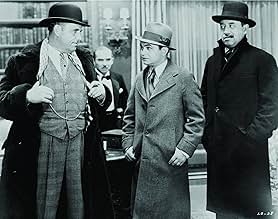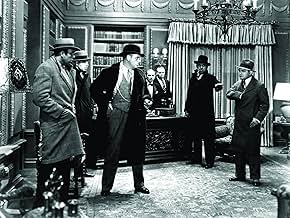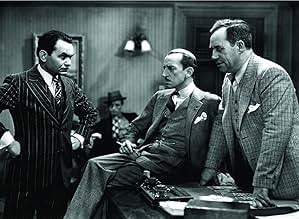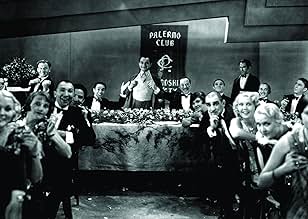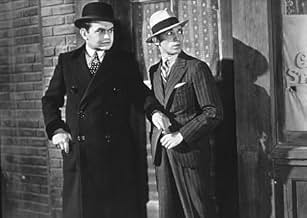IMDb रेटिंग
7.2/10
15 हज़ार
आपकी रेटिंग
एक छोटा-मोटा अपराधी बड़ा भाग्य तलाशने के लिए बड़े शहर में चला जाता है।एक छोटा-मोटा अपराधी बड़ा भाग्य तलाशने के लिए बड़े शहर में चला जाता है।एक छोटा-मोटा अपराधी बड़ा भाग्य तलाशने के लिए बड़े शहर में चला जाता है।
- 1 ऑस्कर के लिए नामांकित
- 2 जीत और कुल 1 नामांकन
Thomas E. Jackson
- Sgt. Flaherty
- (as Thomas Jackson)
Nicholas Bela
- Ritz Colonna
- (as Nick Bela)
Ernie Adams
- Cashier
- (बिना क्रेडिट के)
Elmer Ballard
- Bat Carilla
- (बिना क्रेडिट के)
Ferike Boros
- Mrs. Passa
- (बिना क्रेडिट के)
Kernan Cripps
- Detective
- (बिना क्रेडिट के)
George Daly
- Machine-Gunner
- (बिना क्रेडिट के)
Adolph Faylauer
- New Year's Celebrant
- (बिना क्रेडिट के)
फ़ीचर्ड समीक्षाएं
Edward G. Robinson's memorable performance in "Little Caesar" is rightfully one of his best-remembered roles. While he deserves also to be remembered for his versatility in many other performances as well, it's easy to see why this one in particular is still remembered. Along with James Cagney's role in "The Public Enemy", Robinson's portrayal here helped to exemplify the kinds of characters that for some time defined the genre.
The story is not without interest in itself, as it follows the rise and decline of various gangsters and their followers. The fragile nature of their form of 'power' comes across quite clearly, and of course there is plenty of action as well. It's not especially subtle, but it wasn't supposed to be. The supporting cast all give solid performances, but Robinson's character is always the center of attention. Douglas Fairbanks, Jr. has the most interesting character to work with among the supporting roles.
The story moves at a good pace, especially given its release date, and is over almost before you know it. Even aside from Robinson, it's one of the better features of the earliest years of sound movies, handling the dialogue and sound better than most. Like "The Public Enemy", it was set in its own time, but it's a good production overall that still works rather well decades later.
The story is not without interest in itself, as it follows the rise and decline of various gangsters and their followers. The fragile nature of their form of 'power' comes across quite clearly, and of course there is plenty of action as well. It's not especially subtle, but it wasn't supposed to be. The supporting cast all give solid performances, but Robinson's character is always the center of attention. Douglas Fairbanks, Jr. has the most interesting character to work with among the supporting roles.
The story moves at a good pace, especially given its release date, and is over almost before you know it. Even aside from Robinson, it's one of the better features of the earliest years of sound movies, handling the dialogue and sound better than most. Like "The Public Enemy", it was set in its own time, but it's a good production overall that still works rather well decades later.
WARNING: This review may reveal some scenes of the movie!
In the film that made Edward G. Robinson a star, we get to see one of the nastiest, meanest characters ever put on film. As "Rico," Robinson plays a no-holds barred gangster. As an example, at one point he believes one of his gang is feeling guilty and going to the priest to confess...so he guns him down on the steps of the church.
I first started watching the film simply because I'm a bit of a film buff and felt that it should be a film I see, regardless of how good (or bad) it might be. But by the end of the film, I had been pulled into the story. It revolves around a small-time thug and his buddy who go to the city to make it big. Soon Rico is muscling in on the "big guys" turf, taking over his territory with his own brand of shoot first, ask questions later. I could tell you more, but you should see the movie instead.
Robinson is great in the film. Toward the end of the film there is an amazing shot of just his face, staring into the camera -- no words, no other characters, just Robinson as Rico, and you get a chance to see truly great acting! Just the mood he creates with his eyes alone in this one shot is worth seeing the entire film. Throw in a good storyline, an entire gang of thugs who are terrified of the chief thug, great direction, and you wind up with a great film. And don't worry parents -- this is still a film from 1930, so there is no sex, no language, and even the majority of the violence (which is minimal considering this is a film about the mob!) is hidden from sight. Even the ones you see have no blood involved -- just the sound of a gun and a person slumps over to die.
When you see a film like this on a station like Turner Classic Movies, you get the added benefit of additional trivia. According to the introduction, the book upon which this movie was based was written after the author, listening to a friend of his sing on the radio live from a local club, was gunned down on the air when the mob broke into the club with Tommy guns blazing. Imagine the shock of hearing your friend killed live on the radio...
Finally, during the introduction of the film it was also stated that at the time of release, complaints were made that the film glorified the mob and their violent ways. I disagree. If Robinson's portrayal doesn't turn you off of violence and the mob, then you probably aren't human -- which is probably exactly the point of this film.
In the film that made Edward G. Robinson a star, we get to see one of the nastiest, meanest characters ever put on film. As "Rico," Robinson plays a no-holds barred gangster. As an example, at one point he believes one of his gang is feeling guilty and going to the priest to confess...so he guns him down on the steps of the church.
I first started watching the film simply because I'm a bit of a film buff and felt that it should be a film I see, regardless of how good (or bad) it might be. But by the end of the film, I had been pulled into the story. It revolves around a small-time thug and his buddy who go to the city to make it big. Soon Rico is muscling in on the "big guys" turf, taking over his territory with his own brand of shoot first, ask questions later. I could tell you more, but you should see the movie instead.
Robinson is great in the film. Toward the end of the film there is an amazing shot of just his face, staring into the camera -- no words, no other characters, just Robinson as Rico, and you get a chance to see truly great acting! Just the mood he creates with his eyes alone in this one shot is worth seeing the entire film. Throw in a good storyline, an entire gang of thugs who are terrified of the chief thug, great direction, and you wind up with a great film. And don't worry parents -- this is still a film from 1930, so there is no sex, no language, and even the majority of the violence (which is minimal considering this is a film about the mob!) is hidden from sight. Even the ones you see have no blood involved -- just the sound of a gun and a person slumps over to die.
When you see a film like this on a station like Turner Classic Movies, you get the added benefit of additional trivia. According to the introduction, the book upon which this movie was based was written after the author, listening to a friend of his sing on the radio live from a local club, was gunned down on the air when the mob broke into the club with Tommy guns blazing. Imagine the shock of hearing your friend killed live on the radio...
Finally, during the introduction of the film it was also stated that at the time of release, complaints were made that the film glorified the mob and their violent ways. I disagree. If Robinson's portrayal doesn't turn you off of violence and the mob, then you probably aren't human -- which is probably exactly the point of this film.
LITTLE CAESAR was made at a critical time in U.S. history. Prohibition was in, the depression was overwhelming, and mobsters were running rampant. I don't think the filmmakers realized it, but they have made a movie that paints the "Mafia" as glamorous and flashy. A message appears before the flick, telling the public how "we" must stop gangsters like Tom Powers (James Cagney,PUBLIC ENEMY) and Rico, (Edward G. Robinson, LITTLE CAESAR). The movie probably had youngsters and adults alike wanting to live the life of a man who had a city in his grasp, and no one who was anyone was "yellow". All seriousness aside, this blueprint of a long history of mob pictures is silly, dated, and damn watchable. You can't take your eyes off the screen.
A film with dialogue like the ultimate cliche "Go on. I'm...done for" must be a waste of time right? Not if you appreciate pre-historic cinema and the Vitaphone films of the early talkie period. Actors like the great Edward G. Robinson were born to talk and deliver lines at machine gun pace. This is what the audiences of the time were looking for. And that mug. Audiences would not see such a face on a gangster until Brando's GODFATHER. If you love GOODFELLAS, THE GODFATHER, Cagney and Bogart films, and even PULP FICTION, this is a must see. Experience an American original - the first potent "La Cosa Nostra" movie. Rat tat tat tat tat!!!
RATING: 10 of 10
A film with dialogue like the ultimate cliche "Go on. I'm...done for" must be a waste of time right? Not if you appreciate pre-historic cinema and the Vitaphone films of the early talkie period. Actors like the great Edward G. Robinson were born to talk and deliver lines at machine gun pace. This is what the audiences of the time were looking for. And that mug. Audiences would not see such a face on a gangster until Brando's GODFATHER. If you love GOODFELLAS, THE GODFATHER, Cagney and Bogart films, and even PULP FICTION, this is a must see. Experience an American original - the first potent "La Cosa Nostra" movie. Rat tat tat tat tat!!!
RATING: 10 of 10
Rico Bandello, a petty crook nicknamed LITTLE CAESAR, plots his rise to become crime boss of the Big City.
Edward G. Robinson made a tremendous impact in this star-making saga of a thoroughly detestable little man who bandies his way through society's underbelly for a short time until fate brings him his just reward. The evil spawn of a deplorable age, Rico cares for neither booze nor dames, only pure raw power. Even loyalty & friendship are weaknesses to be deplored since no one can be ultimately trusted. Robinson, with his frightening eyes and large ugly mouth, makes this human scum fascinating to watch - a cheap little monster in expensive suits, a moral nonentity with a big gun.
Douglas Fairbanks Jr does a fine job with what little the script gives him as Rico's longtime buddy; the bland nature of his performance contrasts nicely to Robinson's florid acting style. Even more compelling is Glenda Farrell in an important early role as Fairbanks' girlfriend - this talented actress would soon become one of Hollywood's premiere tough talking brassy blondes.
Stanley Fields, Sidney Blackmer & George E. Stone all deliver vivid portraits of crooks & criminals that Rico must intimidate or use. Special mention should be made of William Collier Jr who gives a touching portrayal as the mob's getaway driver who loses his nerve and attempts to go straight.
Movie mavens will recognize an unbilled Lucille La Verne as the old crone who intimidates Rico near the end of the picture.
With LITTLE CAESAR and PUBLIC ENEMY (1931) Warner Brothers established themselves as the Studio that could produce topnotch, gritty crime dramas. The reputation was well deserved and the films were appreciated by movie viewers already enthralled by the headline exploits of real life Depression desperadoes.
Edward G. Robinson made a tremendous impact in this star-making saga of a thoroughly detestable little man who bandies his way through society's underbelly for a short time until fate brings him his just reward. The evil spawn of a deplorable age, Rico cares for neither booze nor dames, only pure raw power. Even loyalty & friendship are weaknesses to be deplored since no one can be ultimately trusted. Robinson, with his frightening eyes and large ugly mouth, makes this human scum fascinating to watch - a cheap little monster in expensive suits, a moral nonentity with a big gun.
Douglas Fairbanks Jr does a fine job with what little the script gives him as Rico's longtime buddy; the bland nature of his performance contrasts nicely to Robinson's florid acting style. Even more compelling is Glenda Farrell in an important early role as Fairbanks' girlfriend - this talented actress would soon become one of Hollywood's premiere tough talking brassy blondes.
Stanley Fields, Sidney Blackmer & George E. Stone all deliver vivid portraits of crooks & criminals that Rico must intimidate or use. Special mention should be made of William Collier Jr who gives a touching portrayal as the mob's getaway driver who loses his nerve and attempts to go straight.
Movie mavens will recognize an unbilled Lucille La Verne as the old crone who intimidates Rico near the end of the picture.
With LITTLE CAESAR and PUBLIC ENEMY (1931) Warner Brothers established themselves as the Studio that could produce topnotch, gritty crime dramas. The reputation was well deserved and the films were appreciated by movie viewers already enthralled by the headline exploits of real life Depression desperadoes.
There's a villain and he's out to make his name, Caesar Enrico Bandello, just has no shame, with a cannon in his hand, shoot you down just where you stand, there's no way that he'll be stopped, he won't be tamed. He's taken over a small gang, after a heist, where the crime commissioner has paid a price, a rival boss then shoots him down, but it only leaves a frown, then 'Big Boy' gives him Chicago's Northside vice.
Isn't Edward G. Robinson always spellbinding, especially in his more devious roles. The ascent and decent of a larger than life ego, the cost to others and the ultimate price paid in the quest for power.
Isn't Edward G. Robinson always spellbinding, especially in his more devious roles. The ascent and decent of a larger than life ego, the cost to others and the ultimate price paid in the quest for power.
क्या आपको पता है
- गूफ़Rico is hit by the bullet sufficiently to require bandaging by Scabby, but the overcoat he was wearing has no bullet hole in it, nor is there any trace of blood in the subsequent scene in Little Arnie's office.
- भाव
[last lines]
Caesar Enrico Bandello: Mother of Mercy! Is this the end of Rico?
- इसके अलावा अन्य वर्जनIn the 1954 re-release, a foreword crawl was added, warning that the "heroes" of Little Caesar and The Public Enemy (1931) represent "a problem that sooner or later we, the public, must solve." This version is often shown on cable channels.
- कनेक्शनFeatured in Hollywood: The Fabulous Era (1962)
टॉप पसंद
रेटिंग देने के लिए साइन-इन करें और वैयक्तिकृत सुझावों के लिए वॉचलिस्ट करें
- How long is Little Caesar?Alexa द्वारा संचालित
विवरण
- रिलीज़ की तारीख़
- कंट्री ऑफ़ ओरिजिन
- भाषा
- इस रूप में भी जाना जाता है
- Mali Cezar
- फ़िल्माने की जगहें
- उत्पादन कंपनी
- IMDbPro पर और कंपनी क्रेडिट देखें
- चलने की अवधि
- 1 घं 19 मि(79 min)
- रंग
इस पेज में योगदान दें
किसी बदलाव का सुझाव दें या अनुपलब्ध कॉन्टेंट जोड़ें



